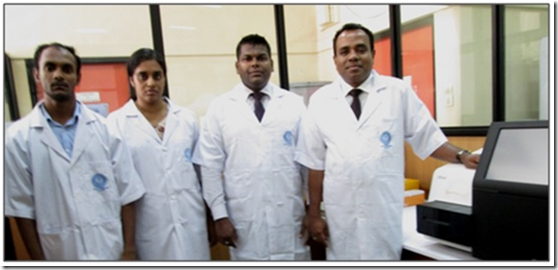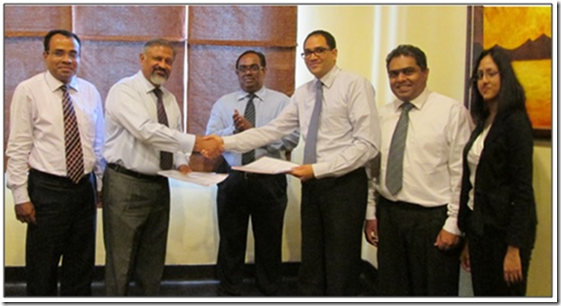
A major milestone in Sri Lankan Genomics Research: Sri Lankan Scientists Sequence the Entire Genome of Goda Wee – an indigenous rice variety
The Human Genetics Unit (HGU), Faculty of Medicine, University of Colombo together with John Keells Research (JKR), a unit established by John Keells Holdings PLC (JKH) to carryout futuristic scientific research, are pleased to announce the successful sequencing of the entire genome of goda wee – an indigenous rice variety. This is the first time that such a feat in the field of science was achieved within the country in Sri Lanka.
Sequencing of goda wee was done in the only genome sequencing facility in Sri Lanka located at the HGU. This facility was established in 2014 with research grants from the University Grants Commission of Sri Lanka and other funding agencies. The work was carried out by Prof. Vajira H. W. Dissanayake MBBS, PhD, FNASSL (Director HGU and Principal Investigator), Dr. Sanjeewa Sinhabahu PhD (Lead Scientist), Dilini Gunawardana MSc (Scientist) and Chathura Wijesinghe BSc (Bioinformatician) from the Synthetic Biology Group at the HGU which was established in 2014 in collaboration with JKR as a University-Industry partnership.
Prof. Vajira H. W. Dissanayake who is also a member of the National Biotechnology Council of the Coordinating Secretariat for Science Technology and Innovation (COSTI) as well as the Biotechnology Committee of the National Science Foundation (NSF) commenting on this achievement stated that “This is a unique milestone in the annals of Science and Technology in Sri Lanka. We have proved that Sri Lanka now has the capability to protect and preserve our biodiversity within the country. This will also open up the opportunity for Sri Lanka to build a new wave of scientific enterprise based on local knowledge and innovation creating wealth for the country. That would in turn create new job opportunities for Sri Lankan science graduates, most of whom now leave the country or leave science and join other fields due to lack of scientific jobs.”
Head of John Keells Research Dr. Muditha D. Senarath Yapa PhD stated that “JKR is proud to be a part of this nationally important milestone which opens the door to many futuristic commercial applications. This proves the ability of Sri Lankan scientists to carryout groundbreaking research which can contribute to national development”. The team from JKR also comprise of Ms. Madushani Kannangara MSc (R & D Scientist).
HGU and JKR would like to acknowledge the support given from the Rice Research and Development Institute (RRDI) at Batalagoda, especially Dr. Kapilasiri Udawela PhD under the direction of Dr. Amitha Bentota PhD Director, RRDI.
The Importance of Whole Genome Sequencing Goda wee
Achievement
The Human Genetics Unit at the Faculty of Medicine, Colombo in collaboration with John Keells Research has sequenced a whole genome of the above rice variety. This is the first time such a feat was achieved in the field of science within the country in Sri Lanka. Whole genome sequencing is a laboratory process that determines the complete DNA sequence of an organism’s genome at once. Genome sequencing results in a massive amount of data which explains how the entire plant works. This achievement has scientific, national and commercial advantages which are listed below.
Scientific
Whole genome sequencing is important
- in finding novel genes, transcription factors, promoters, etc.
- in finding markers and SNPs (single nucleotide polymorphisms) related to stress tolerance, pest and herbicide resistance, crops with higher yield etc., quicker than conventional methods and eventually improving crops through breeding or transgenic programs.
- To compare genes from related species and study their divergence and evolution in order to find genes which have related traits of interest.
- to identify mutations that can be adopted for high throughput genotyping.
- for targeted genome editing.
National
- Goda wee is an indigenous salt tolerant rice variety and the Synthetic biology group at the HGU is the first to sequence its whole plant genome in Sri Lanka.
- Ability to sequence the whole genome in Sri Lanka will allow the safeguarding of endemic biodiversity.
Commercial
Identification of genes enables the improvement of economically important plants
- to increase crop yield in a significant manner
- enable the use of disease resistant traits
- enable the use of drought/salinity resistant traits
- enable the use of pest/weed resistant traits
- enable management of crop ripening and other post-harvest activities
The knowledge gained will allow development of products valuable in fields such as the pharmaceutical industry and energy production (biofuel), and production of value added products (e.g. fiber) using plants.
Knowledge of the genome sequences will enable the use of Genome editing techniques to improve various qualities of the plant thus preventing the plant being labelled as ‘genetically modified’ (Biotechnology Companies, like Cellectis, is using new genome-editing techniques that can change the plant’s existing DNA rather than inserting foreign genes. Cibus, a privately held San Diego company, has started to sell herbicide-resistant canola developed using this method. It is not labeled as genetically modified. This enables the gain of positive public perception when it comes to genetically modified food.)

The ‘Synthetic Biology Team’ at the Human Genetics Unit: From Left to Right: Chathura Wijesinghe (Bioinformatician); Dilini Gunawardana (Scientist); Dr. Sanjeewa Sinhabahu (Lead Scientist); Prof. Vajira H. W. Dissanayake (Director HGU and Principal Investigator).

Signing of the agreement between John Keells Research (JKR) and the Human Genetics Unit (HGU) of the Faculty of Medicine, University of Colombo on 5 May 2014: The picture shows the exchange of the agreement between Prof. Rohan W Jayasekara (Former Dean, Faculty of Medicine and Former Director, Human Genetics Unit, Faculty of Medicine, University of Colombo) and Mr. Gihan Cooray (Head of Corporate Finance and Strategy and Executive Vice President, John Keells Group). In the picture from left to right are: Prof. Vajira H. W. Dissanayake (Professor and Medical Geneticist, Human Genetics Unit, Faculty of Medicine, University of Colombo); Prof. Rohan W Jayasekara; Dr. Sunil Jayantha Nawaratne, (Former Secretary, Ministry of Higher Education); Mr. Gihan Cooray; Dr. Muditha Senarath Yapa (Head, John Keells Research); and Ms. Madushani Kannangara (R & D Scientist – Molecular Life Sciences, John Keells Research).






